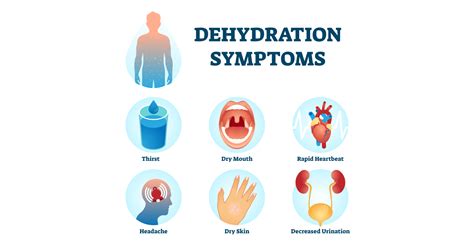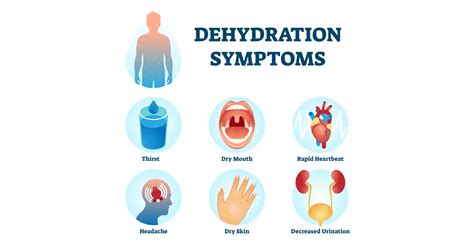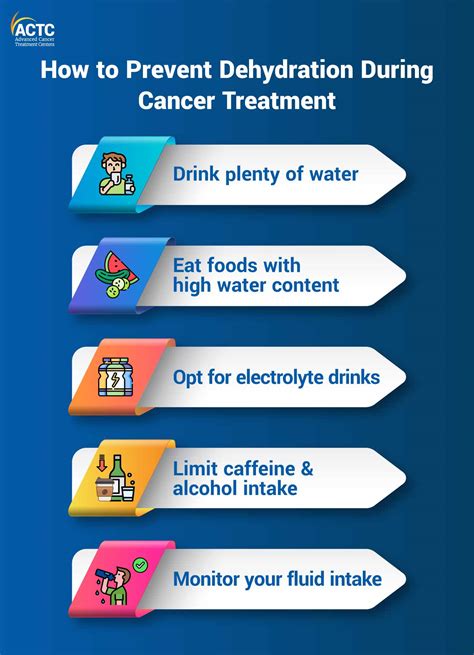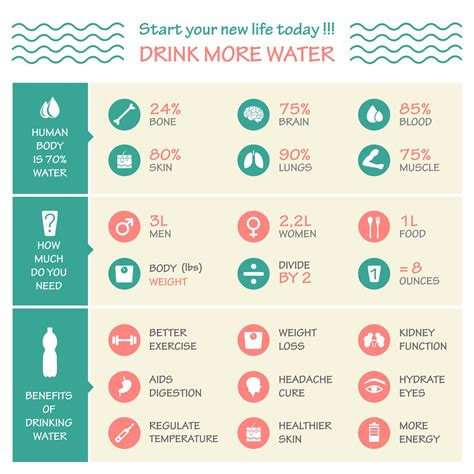Intro
Identify 7 dehydration symptoms, including dry mouth, fatigue, and dizziness. Learn to recognize early signs of dehydration, heat exhaustion, and fluid imbalance to stay hydrated and healthy.
Dehydration is a common yet often overlooked health issue that can affect anyone, regardless of age or physical condition. It occurs when the body loses more fluids than it takes in, causing an imbalance in the amount of water and electrolytes needed to function properly. Dehydration can be mild, moderate, or severe, and its symptoms can range from mild to life-threatening. In this article, we will delve into the importance of recognizing dehydration symptoms and the steps you can take to prevent and treat this condition.
Dehydration can be caused by various factors, including excessive sweating, diarrhea, vomiting, fever, and certain medications. It can also be a result of not drinking enough water or fluids, especially in hot weather or during intense physical activity. The symptoms of dehydration can be subtle, making it essential to be aware of the warning signs to seek medical attention if necessary. By understanding the causes and symptoms of dehydration, you can take proactive steps to protect your health and well-being.
Recognizing dehydration symptoms is crucial, as it can help you take prompt action to address the issue. Dehydration can lead to serious complications, such as heatstroke, kidney damage, and even death if left untreated. Therefore, it is vital to be aware of the common symptoms of dehydration and to seek medical attention if you or someone you know is experiencing severe dehydration. In the following sections, we will explore the common symptoms of dehydration, their causes, and the steps you can take to prevent and treat this condition.
Introduction to Dehydration Symptoms

Dehydration symptoms can vary depending on the severity of the condition. Mild dehydration may cause symptoms such as dry mouth, fatigue, and headaches, while severe dehydration can lead to life-threatening complications. It is essential to recognize the early warning signs of dehydration to seek medical attention if necessary. In this section, we will explore the common symptoms of dehydration and their causes.
Common Causes of Dehydration
Dehydration can be caused by various factors, including: * Excessive sweating * Diarrhea * Vomiting * Fever * Certain medications * Not drinking enough water or fluidsThese factors can lead to an imbalance in the amount of water and electrolytes in the body, causing dehydration. It is essential to be aware of these causes to take proactive steps to prevent dehydration.
7 Dehydration Symptoms to Watch Out For

The following are 7 common dehydration symptoms to watch out for:
- Dry mouth and throat: A dry mouth and throat can be an early warning sign of dehydration. If you notice that your mouth and throat are dry, it may be a sign that your body is not getting enough fluids.
- Fatigue and weakness: Dehydration can cause fatigue and weakness, making it difficult to perform daily activities. If you feel tired and weak, it may be a sign that your body is dehydrated.
- Headaches: Dehydration can cause headaches, which can range from mild to severe. If you experience frequent or severe headaches, it may be a sign of dehydration.
- Dizziness and lightheadedness: Dehydration can cause dizziness and lightheadedness, especially when standing up quickly. If you experience dizziness or lightheadedness, it may be a sign that your body is dehydrated.
- Dark urine: Dark urine can be a sign of dehydration. If your urine is dark yellow or amber-colored, it may be a sign that your body is not getting enough fluids.
- Rapid heartbeat: Dehydration can cause a rapid heartbeat, which can be a sign of severe dehydration. If you experience a rapid heartbeat, it is essential to seek medical attention immediately.
- Confusion and disorientation: Severe dehydration can cause confusion and disorientation, which can be life-threatening if left untreated. If you or someone you know is experiencing confusion or disorientation, it is essential to seek medical attention immediately.
Treatment and Prevention of Dehydration
Treatment and prevention of dehydration involve drinking plenty of fluids, such as water, clear broths, and electrolyte-rich beverages like sports drinks. It is also essential to avoid caffeinated and carbonated beverages, which can exacerbate dehydration. In severe cases of dehydration, medical attention may be necessary to restore fluids and electrolytes.Prevention of Dehydration

Preventing dehydration is essential to maintaining good health. The following are some tips to prevent dehydration:
- Drink plenty of fluids, such as water, clear broths, and electrolyte-rich beverages like sports drinks.
- Avoid caffeinated and carbonated beverages, which can exacerbate dehydration.
- Eat foods that are high in water content, such as fruits and vegetables.
- Avoid excessive sweating by staying cool and taking regular breaks.
- Monitor your urine output and color to ensure that you are getting enough fluids.
Conclusion and Final Thoughts
In conclusion, recognizing dehydration symptoms is crucial to maintaining good health. By being aware of the common causes and symptoms of dehydration, you can take proactive steps to prevent and treat this condition. It is essential to drink plenty of fluids, avoid caffeinated and carbonated beverages, and eat foods that are high in water content to prevent dehydration. If you or someone you know is experiencing severe dehydration, it is essential to seek medical attention immediately.Final Thoughts on Dehydration

In final thoughts, dehydration is a common yet often overlooked health issue that can affect anyone, regardless of age or physical condition. By being aware of the common causes and symptoms of dehydration, you can take proactive steps to prevent and treat this condition. It is essential to prioritize your health and well-being by staying hydrated and seeking medical attention if necessary.
We invite you to share your thoughts and experiences with dehydration in the comments section below. Have you or someone you know experienced dehydration? What steps did you take to prevent and treat it? Share your story with us, and let's work together to promote good health and well-being.
What are the common causes of dehydration?
+Dehydration can be caused by various factors, including excessive sweating, diarrhea, vomiting, fever, and certain medications.
What are the symptoms of dehydration?
+The symptoms of dehydration can range from mild to severe and include dry mouth and throat, fatigue and weakness, headaches, dizziness and lightheadedness, dark urine, rapid heartbeat, and confusion and disorientation.
How can I prevent dehydration?
+Preventing dehydration involves drinking plenty of fluids, such as water, clear broths, and electrolyte-rich beverages like sports drinks. It is also essential to avoid caffeinated and carbonated beverages, eat foods that are high in water content, and avoid excessive sweating.
